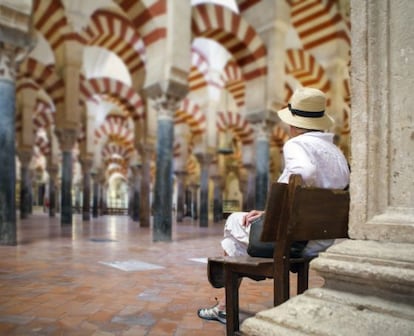Taking back Córdoba Mezquita from Church makes no sense, argues minister
Institution registered World Heritage Site in its name in 2006 using Francoist law expanded by PP

Justice Minister Alberto Ruiz-Gallardón has rejected the possibility of taking ownership of Córdoba’s famous Mezquita away from the Catholic Church, which added it to its list of properties in 2006, using a law allowing it to appropriate any temple of worship that is without a registered owner.
Speaking in the Senate on Tuesday, Ruiz-Gallardón, of the conservative Popular Party (PP), argued that such an expropriation would make no sense from a legal standpoint, as such a possibility could only be contemplated in the event that the building was at risk of destruction or deterioration, which was not the case.
It would also make no sense financially, he added, as the compensation for the expropriation would represent “vast” amounts of money. This is in contrast to the minimal cost to the Church of registering the ownerless temples to its name.
The remarks were triggered by a question put to the justice minister by Senator José Manuel Mariscal of the United Left coalition regarding whether the government plans to eliminate the “anachronistic privilege” that lets bishops register in their diocese’s name any building, warehouse, cemetery, garage or vegetable garden without first proving ownership. The privilege was created by a 1946 law passed by Franco, who nevertheless stopped short of letting the Church take over places of worship. In 1998, the conservative administration of José María Aznar expanded it to include these sites as well.
The Córdoba Mezquita is a case study in the real estate ambitions of the Catholic Church
While the issue came to the fore in 2011, the then-ruling Socialists did nothing about it. Now, Ruiz-Gallardón said the government has indeed approved a draft reform of mortgage legislation to eliminate the privilege. But the IU senator noted that there was a “loophole” to this in the form of a one-year moratorium between the time the law is published and when it goes into effect, which will provide the Church with “ample time to register even more assets to its name.”
Since 1946, the Catholic Church has registered thousands of properties and temples. While the exact number is not known, sources with knowledge of the Property Registration Office estimate the figure to be around 4,500. In fact, many mayors of small towns are still unaware that the local church or shrine no longer belongs to the townspeople, while a few have launched legal battles to reclaim the communal properties.
The Córdoba Mezquita, which is a Unesco World Heritage Site and a magnet for millions of tourists, is a case study in the real estate ambitions of the Church. After appropriating the property in 2006, it proceeded to insist on the Catholic nature of the monument despite its original – and architectural – status as a mosque, triggering citizen movements to reclaim the Mezquita for the public domain.
Tu suscripción se está usando en otro dispositivo
¿Quieres añadir otro usuario a tu suscripción?
Si continúas leyendo en este dispositivo, no se podrá leer en el otro.
FlechaTu suscripción se está usando en otro dispositivo y solo puedes acceder a EL PAÍS desde un dispositivo a la vez.
Si quieres compartir tu cuenta, cambia tu suscripción a la modalidad Premium, así podrás añadir otro usuario. Cada uno accederá con su propia cuenta de email, lo que os permitirá personalizar vuestra experiencia en EL PAÍS.
¿Tienes una suscripción de empresa? Accede aquí para contratar más cuentas.
En el caso de no saber quién está usando tu cuenta, te recomendamos cambiar tu contraseña aquí.
Si decides continuar compartiendo tu cuenta, este mensaje se mostrará en tu dispositivo y en el de la otra persona que está usando tu cuenta de forma indefinida, afectando a tu experiencia de lectura. Puedes consultar aquí los términos y condiciones de la suscripción digital.








































